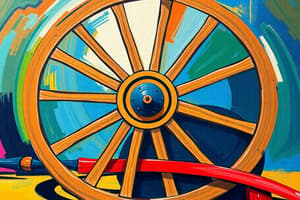Podcast
Questions and Answers
What defines a historical antecedent in the context of science and technology?
What defines a historical antecedent in the context of science and technology?
- It is a precursor that paved the way for future advancements. (correct)
- It symbolizes the decline of scientific progress.
- It refers to the latest advancements in science and technology.
- It is a tool used for scientific measurement.
What advancement did the Sumerians contribute to the development of transportation?
What advancement did the Sumerians contribute to the development of transportation?
- The invention of the first cart.
- The introduction of animal transportation.
- The invention of the potter’s wheel that led to the wheel. (correct)
- The general agreement on when to use wheels.
How did writing practices change with the invention of paper?
How did writing practices change with the invention of paper?
- Writing was done primarily on cloth instead of stone.
- Writing became more reserved for religious texts.
- Writing became easier and less reserved for special occasions. (correct)
- Writing was abolished in favor of oral traditions.
What was the purpose of the shadoof invented by ancient Egyptians?
What was the purpose of the shadoof invented by ancient Egyptians?
What was the significance of the Antikythera mechanism in history?
What was the significance of the Antikythera mechanism in history?
Which period saw the significant advances in science and technology that allowed civilizations to flourish?
Which period saw the significant advances in science and technology that allowed civilizations to flourish?
What major limitation did early writing tools, such as those used on stone, impose?
What major limitation did early writing tools, such as those used on stone, impose?
What innovation allowed the use of wheels for transportation in carts?
What innovation allowed the use of wheels for transportation in carts?
What was the primary purpose of the Antikythera mechanism?
What was the primary purpose of the Antikythera mechanism?
What significant agricultural advancement is attributed to the heavy plough?
What significant agricultural advancement is attributed to the heavy plough?
What invention is considered a precursor to the steam engine?
What invention is considered a precursor to the steam engine?
How did the introduction of paper money impact trade?
How did the introduction of paper money impact trade?
Which of the following statements is true about the mechanical clock?
Which of the following statements is true about the mechanical clock?
What was a major consequence of the invention of gun powder?
What was a major consequence of the invention of gun powder?
Where is it believed that the spinning wheel originated?
Where is it believed that the spinning wheel originated?
What significant change occurred during the Middle Ages regarding scientific thought?
What significant change occurred during the Middle Ages regarding scientific thought?
What was the role of the Antikythera mechanism in ancient Greek society?
What was the role of the Antikythera mechanism in ancient Greek society?
What was a key feature of the heavy plough that changed European agriculture?
What was a key feature of the heavy plough that changed European agriculture?
Study Notes
Historical Antecedent
- An antecedent refers to a precursor or earlier stage that contributes to the development of something.
- In Science and Technology, historical antecedents represent tools and concepts that led to advanced scientific and technological progress.
Ancient Period
- Ancient civilizations' rise facilitated significant advances in science and technology, impacting living standards, communication, transportation, and organization.
Ancient Wheel
- The potter’s wheel, invented by Sumerians around 3500 BC, inspired the creation of the wheel for transportation.
- First applications of the wheel on carts occurred 1000 to 1500 years after its initial invention.
Paper
- Writing was initially done on stone, which was impractical; hence, writing was limited to special occasions until more accessible materials emerged.
Shadoof (Shaduf)
- Ancient Egyptians invented the shadoof, a tool utilizing counterweights for lifting water, improving irrigation efficiency for crop cultivation.
Antikythera Mechanism
- An ancient analog computer discovered in 1902, believed to have been created by Greek scientists between 150–100 BC.
- Predicted celestial events and eclipses for calendar and astrological uses, showcasing early mechanical sophistication.
Aeolipile (Hero’s Engine)
- Considered the precursor to the steam engine, demonstrating early inventions related to motion and energy.
Middle Ages
- Marked by important scientific and technological advancements and the emergence of scientific thinking in medieval universities.
- Innovations during this period laid the foundation for many contemporary technologies.
Heavy Plough
- The introduction of the heavy plough revolutionized European agriculture, enabling higher yields from clay soils.
Gun Powder
- Invented around 850 AD by Chinese alchemists while attempting to create an elixir of life, significantly transforming warfare by leading to the development of cannons and grenades.
Paper Money
- Emerged in China during the 17th century AD as an extension of block printing, offering a more efficient and portable alternative to gold and silver currencies.
Mechanical Clock
- Revolutionized timekeeping and work patterns, enhancing daily life and productivity in urban centers.
Spinning Wheel
- Originated between the 6th and 11th centuries in India for spinning fiber into thread, increasing production efficiency by 10 to 100 times.
- Contributed to advancements in linen production in 13th century Europe.
Modern Ages
- Characterized by a steady increase in world population and a heightened focus on improving transportation efficiency and connectivity.
Studying That Suits You
Use AI to generate personalized quizzes and flashcards to suit your learning preferences.
Description
Explore the significant historical antecedents that shaped the advancement of science and technology. From the invention of the wheel to the development of paper and the shadoof, discover how ancient innovations transformed human life and civilization. This quiz highlights key tools and concepts from ancient times that laid the groundwork for future technological progress.




